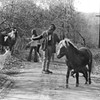Published February 5, 2003 at 5:00 p.m.
"How many of you asked your parents about the day you were born?" Dr. Barbara Frankowski asks a fifth-grade class at Burlington's H.O. Wheeler School. Small hands shoot into the air. "Isn't that cool," the 48-year-old pediatrician proclaims. She had suggested that family discussions follow her session a week ago on reproduction. "Anyone see pictures?" Several small heads nod. Today these 10- and 11-year-olds are getting part two of the lesson -- one that covers HIV and AIDS.
As the physician in charge of sex education for the city's youngsters in fourth through ninth grades, Frankowski -- a petite Long Island native who has lived in Vermont since 1985 -- must maintain a delicate balance. The subject matter can be a minefield.
Straightforward discussions to help kids navigate the raging hormones of their adolescent and teen-age years might conflict with moral or religious views, particularly in an era dominated by conservative family values. "We really count on parents to be partners in this," Frankowski, a Jericho resident, says of her challenging mission. "I tell the students, 'Your parents are the experts on you.'"
SEVEN DAYS: What prepared you for this career?
BARBARA FRANKOWSKI: Originally, I wanted to be a teacher. But once I decided to become a doctor, it was clear to me I was aiming for pediatrics. I attended medical school at Johns Hopkins in Baltimore and did my pediatric residency at Case Western Reserve in Cleveland. My first real job was here with University Pediatrics at what's now the Children's Hospital of Vermont at Fletcher Allen Health Care.
SD: When and how did you add the Burlington School Department responsibilities to what must already be a busy schedule?
BF: Eight or nine years ago, I was recommended by the pediatrician who developed the sexuality curriculum -- which I've since updated -- and took the job of health consultant when she left. I have a dual role. Because I've been a pediatrician for 17 years, I've taken care of a lot of those kids since they were in diapers. Parents have more trust because of that. This probably wouldn't work very well if some random provider was just plopped down in the schools.
SD: Describe the logistics of reaching so many students.
BF: I do it for two half-days a week. All the fourth and sixth graders get one hour-long session a year. For fifth graders, I go in twice a year. Seventh through ninth have one annual double period of one and a half hours. It's always a little challenging to fit in all those classes within nine months of the school year. You can't really do it in an assembly; they get too giggly and there's no chance to ask questions.
SD: Why don't you offer sex education to grades ten through twelve? That seems like the population most in need of it.
BF: By then, they've gotten the information. Many of them have been with me over the years. You have to weigh the benefits of a class versus one-on-one guidance. School nurses often become confidants at that point.
SD: Why do you begin as early as fourth grade?
BF: The idea is to give them the information and skills long before the age they're most likely to become sexually active. But I always refer them back to their parents, especially on controversial topics like abortion.
SD: What topics are appropriate at the different stages of their lives?
BF: In fourth grade, we talk about the body changes that accompany puberty. I teach the scientific words: They learn that genitals is a fancy name for the private area, for example. The notion of vaginas always puzzles them - there are high school girls who don't understand what a vagina is. I also stress that they have to be respectful of one another, not use words that make someone else feel bad about their body. I don't want sex to be some big, dirty secret, because it's not. I treat it all matter-of-factly so they can see it as part of the whole person growing up.
SD: With the Wheeler class, you cover some complex concepts. The students first have to comprehend what an immune system is before being able to understand AIDS is a disease that destroys it. And don't they need to know the meaning of intravenous drug use when you enumerate the various ways people can be exposed to HIV?
BF: Yes. Many kids are surprisingly streetwise, though.
SD: Is there a big leap when they reach sixth grade?
BF: When I did all of Edmunds Middle School in the fall, they had already organized two sixth-grade dances! I was amazed. In those classes, we talk about romantic relationships. I tell them it's important to know about respect, responsibility and risks. They need to understand that you can get diseases if you engage in sex. They're so shy, so I have them write down their questions for me ahead of time and anonymously.
SD: What sorts of questions do they ask?
BF: Well, they frequently want to know the meaning of words they've heard.
SD: Such as?
BF: Blow job, for instance.
SD: How do you define it for them?
BF: I give very simple, very scientific explanations: "When an adult puts their mouth on a partner's genitals" is all I'll say. They usually react with, "Ewww, that's gross!"
SD: It must start to get really dicey with seventh graders.
BF: Kids should learn these things two or three years before they actually need it. For seventh and eighth grades, I talk about condoms and birth control pills, but emphasize that sexual relationships should never be casual, should always be within the context of love. Especially for that age group, however, I use an abstinence-based curriculum -- and abstinence includes refraining from oral sex. Abstinence is the safest, healthiest form of protecting against pregnancy or disease. I point out that more than half of all high school students are not having sex.
SD: They aren't?
BF: There is a nationwide Youth Risk Behavior Survey done every other year with eighth, tenth and twelfth graders. We're moving in the right direction. For Burlington, the percentage of sexually active high school students went down between 1999 and 2001. Fewer than half of those in the three grades that are surveyed have had sex. But if you look at just seniors, the number jumps to more than half.
SD: How do you deal with the ninth grade, since it's the last they'll see of you?
BF: I come into schools as part of health class. We discuss sexually transmitted diseases. I show them birth control devices and condoms, but mention the failure rate. I'll hold up a package of condoms and say, "There's no money-back guarantee with this if you get pregnant or sick."
SD: If they're already sexually active, do you advise them how to be safe?
BF: That's not my main focus, but yes. I say, "Hopefully, it'll be years before you need this information, but you should know what you're doing if you're going to make the decision to have intercourse." I use my fingers to demonstrate how condoms work, telling them to watch out for rips, how to put one on, how to come out of a partner's body, how to dispose of it properly.
SD: Is that ever awkward?
BF: The teens certainly don't seem to be embarrassed and it's hard to get me rattled. But I'm very mindful of the proper vocabulary. I always imagine someone's mother is sitting in the back of the room and listening to me. What I'm telling kids is not something to keep hidden from parents, who can build on those facts with the hopes and expectations they have for their children. We're all in this together.
More By This Author
Speaking of...
-

Vermont to Open $20 Million Business Flood Relief Fund
Jul 27, 2023 -

Video: Following Seven Days' Paper Trail to Québec
Jun 21, 2023 -

Rochester Grocery Store to Close, Leaving Residents in the Lurch
Apr 24, 2023 -

Video: Saying Goodbye to Burlington’s Penny Cluse Café
Nov 17, 2022 -

Essay: Natalie Miller Riffs on How Her Nightclub Survived the Pandemic
Sep 14, 2022 - More »
Comments
Comments are closed.
From 2014-2020, Seven Days allowed readers to comment on all stories posted on our website. While we've appreciated the suggestions and insights, right now Seven Days is prioritizing our core mission — producing high-quality, responsible local journalism — over moderating online debates between readers.
To criticize, correct or praise our reporting, please send us a letter to the editor or send us a tip. We’ll check it out and report the results.
Online comments may return when we have better tech tools for managing them. Thanks for reading.











































